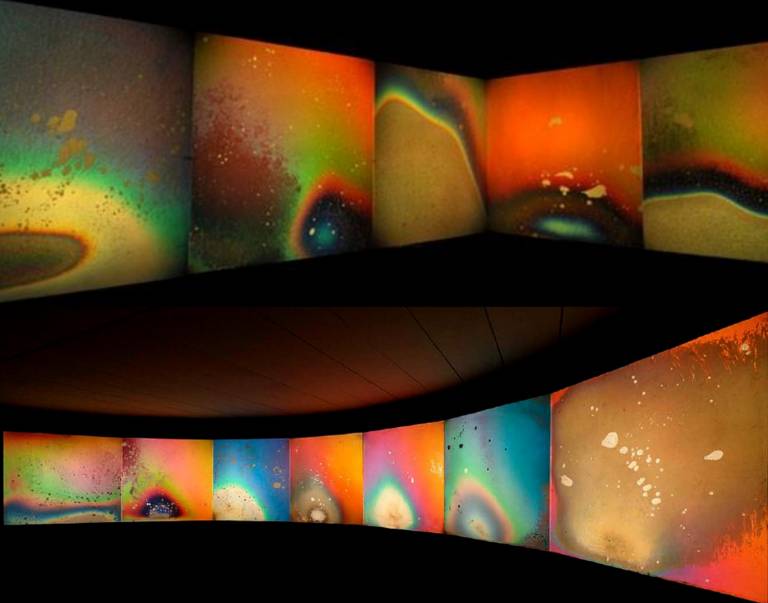Workshop and Lecture with Dr Jonathan Kemp
08 November 2023–09 November 2023, 10:00 am–5:00 pm

This event is free.
Event Information
Open to
- All
Availability
- Yes
Cost
- Free
Organiser
-
Queenie Lee – History of Art
Location
-
Room 10220 Gordon SquareLondonWC1H 0AWUnited Kingdom
Workshop:
Reimagining Gustav Metzger's Liquid Crystal Environment (1965-67,1998-2022, 2073)
Gustav Metzger is known as the father of auto-destructive art; with Liquid Crystal Environment Metzger demonstrated how auto-destruction was inextricably bound to its symbiotic twin, auto-creation. Metzger began his most successfuly auto-creative art work Liquid Crystal Environment in the 1960s using a slide projector, handmade 'liquid crystal' chemical slides, and a blow torch to heat the slides so their state changed between liquid, solid and crystalline. It is these brightly coloured changes that the viewer sees in what was first a very ephemeral, time- and site-specific experience.
In the 1998 Gustav revived Liquid Crystal Environment with engineer Adrian Fogarty (19xx-2018) who automated the work. Over several years Adrian developed a computer-driven device to fit to a then-standard Kodak carousel slide projector that could change the temperature inside the projector, regulate the brightness of the lamp and rotate a polarising filter, all to create transformations in the liquid crystal slides. There were at least 5 versions of the work and several different institutions own them including the Tate, who bought the 5-screen version in 2006. With both Gustav and Adrian no longer with us their maintenance and set up is distributed amongst various conservator-engineer teams in both the UK and Europe, each with more and more remote links to the works originators.
In this 2-day, hands-on workshop, participants will be invited to reimagine this work through historically-informed remaking methodologies. Led by Dr Jonathan Kemp (University of Melbourne), it will rehearse issues of reproduction, version control, authorship, and technique. Registration is free, but mandatory. Spaces are limited. Students from the BA in History of Art - Art, Materials and Techniques route will have priority booking.
The workshop will take place from 12-5pm on 8 November and 10am-5pm on 9 November.
Lecture
Forkology: conservators as art-developers
This talk is about conservation being a form of version control. I will argue that all artworks are 'forked-out' of being the creative output of a singular creative origin (viz. 'the sovereign artist') when conservators (& others) produce the next iteration of a work. I will illustrate how conservators engage in a form of what I call ‘ontological constructivism’ in which they use adversarial, anexact, and generative processes that in effect make them ‘art-developers’ when they commit to their version of a work. I will then demonstrate how conservation has parallels with software development, and as a result how conservation should be seen as a form of version control and that conservators create time-stamped ‘versions of record’ that persist until the next cycle of care. In the final part of the talk I will briefly describe a series real or hypothetical ‘endgames’ to illustrate how conservation as version control affords cultural heritage an ontological openness which in turn makes conservators complicit as art-developers whenever they are 'taking care of things'.
The lecture will take place from 10-11am on 8 November.
In terms of registration:
• Lecture: Open to all, registration is advised
• Workshop: Places are limited to 14 students
About the Speaker
Dr Jonathan Kemp
Senior Lecturer at the Grimwade Centre for the Conservation of Cultural Materials at University of Melbourne
Dr Jonathan Kemp has worked in sculpture conservation for over 30 years, with a focus on stone and allied materials in Australia, Brazil, Canada, Iran, Japan, Taiwan, the UK and Ukraine. He was a Senior Conservator at the V&A Museum, London, and he is a Senior Lecturer at the Grimwade Centre for the Conservation of Cultural Materials at the University of Melbourne. He has published on conservation theory and ethics and new media art along with various technical studies, and is Editor of the Journal of the Institute of Conservation. His PhD was a media archaeological project on the geology of computing. For over 20 years he has both initiated and co-organised art-related projects including DIY material processing laboratories, environmental installations, performances, interdisciplinary symposia, and social software events executed in various international media art festivals and venues throughout Europe, the US, Brazil, Japan, Taiwan and Australia.
More about Dr Jonathan Kemp Close
Close

